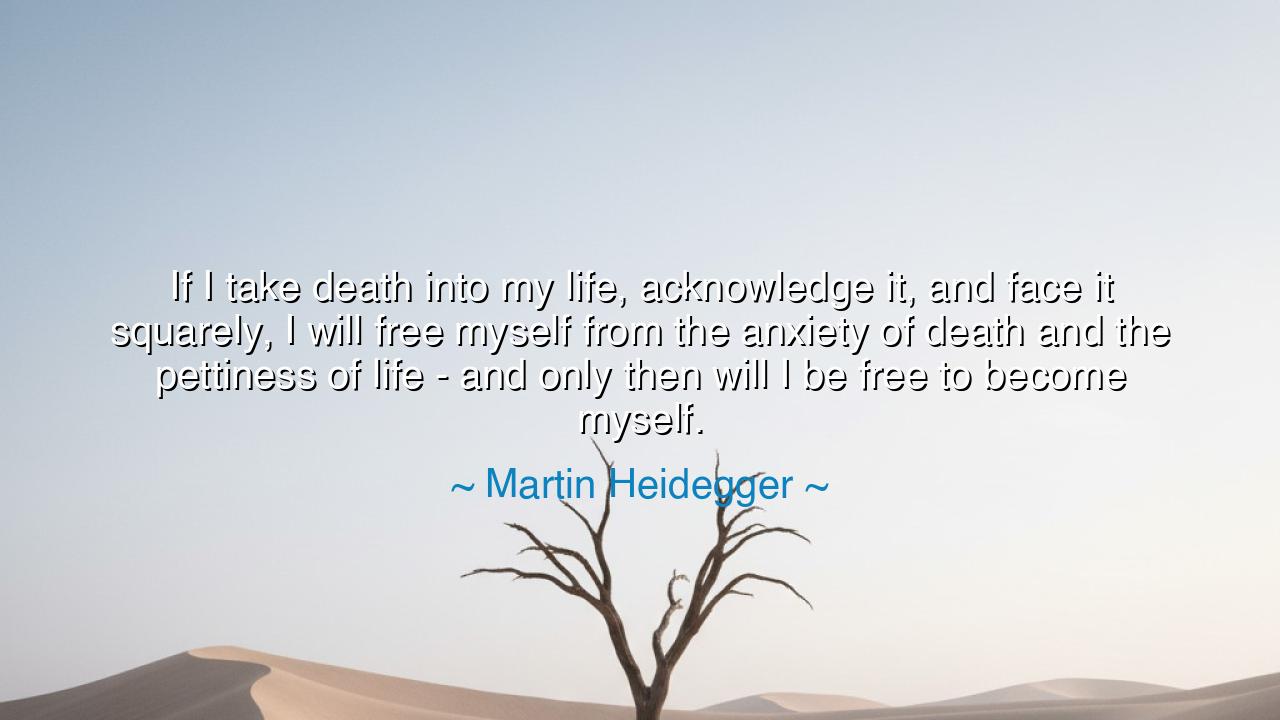
If I take death into my life, acknowledge it, and face it
If I take death into my life, acknowledge it, and face it squarely, I will free myself from the anxiety of death and the pettiness of life - and only then will I be free to become myself.






Martin Heidegger once declared: “If I take death into my life, acknowledge it, and face it squarely, I will free myself from the anxiety of death and the pettiness of life — and only then will I be free to become myself.” These words, drawn from the depths of existential philosophy, are not a lament but a revelation. Heidegger, one of the great minds of the twentieth century, was no stranger to the mysteries of being and mortality. He sought to awaken humanity from its slumber of distraction — to remind us that the shadow of death, far from being our enemy, is our greatest teacher. To live without fear, one must first walk hand in hand with the awareness of their own end.
To take death into one’s life is not to worship it, but to accept its certainty. Most men flee from death in thought and in deed — they bury themselves in work, in pleasure, in trivial pursuits — anything to silence the quiet voice that reminds them of their mortality. Yet in doing so, they also flee from life itself. Heidegger saw this truth clearly: when one denies death, one becomes trapped in pettiness — clinging to shallow desires, offended by trifles, obsessed with status and appearance. But when one accepts death — truly and completely — one is stripped of illusion. What remains is the raw, unadorned essence of being, the self that stands face to face with eternity.
For the ancients, this idea was not new. The Stoics of old — Seneca, Epictetus, Marcus Aurelius — all taught that the contemplation of death is the foundation of wisdom. Memento mori, they said: remember that you must die. Not as a curse, but as a compass. The man who remembers his mortality ceases to waste his life. He no longer quarrels over vanity, nor trembles before loss, for he knows all things are fleeting. He lives with greater intensity, not because he despairs, but because he sees the sacredness of every breath. Thus, in facing death, he discovers the freedom to live.
Consider the life of Nelson Mandela. Imprisoned for twenty-seven years, faced daily with the possibility of execution, he learned what it meant to confront death without fear. In that long darkness, he was refined, like iron in fire. When he emerged, he was no longer bound by anger or vengeance; he had become a man of peace. The constant nearness of death had freed him from the smallness of life’s grievances, and in that liberation, he found the strength to forgive his enemies. His life is the living proof of Heidegger’s truth — that to face death squarely is to transcend fear, and in transcending fear, to become wholly oneself.
Heidegger’s insight also pierces the modern soul, which hides from death more than any generation before. Surrounded by machines, by comfort, by endless noise, modern man believes he has conquered mortality — yet in truth, he lives haunted by it. He fears aging, he fears loss, he fears stillness. He lives in constant anxiety, because he refuses to look at the truth that would set him free. The denial of death is the denial of reality, and the denial of reality is the death of the soul. To live authentically, one must cease pretending that life is endless, and instead, live as though each moment were a final gift.
To acknowledge death, then, is not a morbid act — it is an awakening. When you accept that you will die, you also accept that you are alive now. The sunlight on your face, the laughter of a friend, the quiet of the night — all become infinitely precious. You stop waiting for “someday” and begin to live today. The fear of death is replaced by gratitude for life, and in that gratitude, the soul expands. The petty concerns that once enslaved you — envy, pride, resentment — lose their hold, for you see how meaningless they are beside the vastness of existence.
So let this be your lesson: do not flee from death — learn from it. Speak its name without trembling. Remember that your days are numbered, and let that remembrance make each one radiant. When sorrow comes, let it humble you; when joy comes, let it fill you without restraint. Make peace quickly, love deeply, and waste no time in hatred. For as Heidegger teaches, only the one who has faced death can truly be free to become themselves — unafraid, undistracted, alive in every sense of the word.
In the end, death is not the thief of meaning, but its giver. It is the horizon against which the beauty of life shines brightest. To live with death beside you is to live awake — to stand in reverence before the mystery of being, and to know that every moment is both fragile and eternal. Take death into your life, then, not as an enemy but as a friend. For in learning to die, you will finally learn how to live — and in living thus, you will at last become who you were always meant to be.






AAdministratorAdministrator
Welcome, honored guests. Please leave a comment, we will respond soon